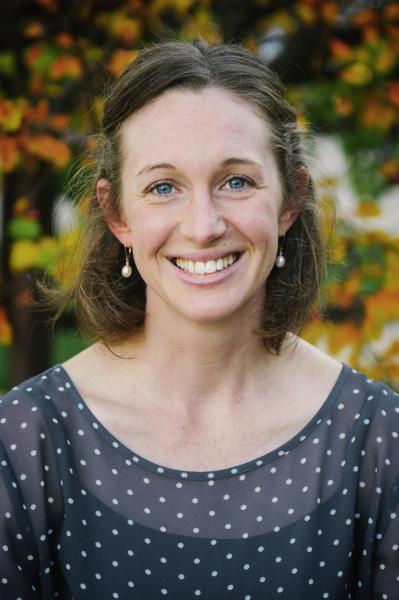The university remains open. For changes to schedules, including remote instruction and operations due to expected weather conditions, check the Rutgers–New Brunswick Operating Status page.

Laura Hanson Schlachter traces her interest in alternative workplaces to community-based undergraduate immigration courses at Whitman College in Washington State, which included study trips to the U.S.- Mexico border and, closer to home, Walla Walla. It was on these expeditions that she was exposed to the precarious situation of farmworkers in eastern Washington and inspired to seek out constructive ways to get involved.

Sociology Ph.D. Candidate at the
University of Wisconsin-Madison,
received a Rutgers Research
Fellowship as part of SMLR’s
Fellowship Program on Employee
Ownership and Profit Sharing.
Schlachter, now a Rutgers School of Management and Labor Relations Research Fellow and a Ph.D. candidate at the University of Wisconsin-Madison, says those undergraduate field experiences stirred an early interest in cooperatives.
“A friend of mine was on the national board of United Students for Fair Trade and suggested that we start a food cooperative as a way of educating the community and campus about what a more just food system could look like,” recalls Schlachter.
She was intrigued by the possibilities and opportunities of that business model to empower individual workers and increase the level of economic equality in a community.
Schlachter’s interest grew during a semester abroad in Botswana, where her host mother was the first female general manager of the village cooperative. “In Botswana, I started to think about the relationship between the cooperative business model and gender empowerment,” she says. After graduation, Schlachter worked for a nonprofit in Rwanda that supported women artisans interested in forming their own cooperatives.
In 2009, Schlachter returned to the States and, as a founder of the Miami River Foods Project, continued this economic development work in her hometown by helping farmers to take an ownership role in distributing the food they produced. In order to achieve that goal, the collective launched the Stone’s Throw Market food cooperative. But soon after Schlachter left to study public policy at Princeton University’s Woodrow Wilson School in 2011, the cooperative collapsed. “There has been a lot of research on what makes coops successful, and Stone’s Throw taught me the hard way that distributed leadership is absolutely crucial,” she says.
Currently Schlachter’s research is focused on shared ownership, climate change, and alternative models of economic development. She is a 2015-16 recipient of the Rutgers Research Fellowship in SMLR’s Fellowship Program on Employee Ownership and Profit Sharing, which supported her work on the implications of labor movement involvement in democratic worker ownership initiatives across the U.S. She has conducted qualitative fieldwork in Cincinnati, Ohio and Madison, Wisconsin to examine how union activists are exploring new ways to translate their goals into the market.
She is also directing the first individual-level, cross-sectional national survey of cooperative worker-owners in the U.S. in partnership with the Democracy at Work Institute (DAWI). The DAWI Worker Co-op Census mimics the methodology of the landmark 2010 National Bureau of Economic Research (NBER) Shared Capitalism at Work study (done by Rutgers SMLR Professors Douglas Kruse and Joseph Blasi and Harvard Professor Richard Freeman) but extends the survey sample to individual employees and worker-owners at democratic workplaces and worker cooperatives across the U.S.
“I think that we have a lot of examples of cooperatives that have successfully created opportunities for worker empowerment and spread wealth more evenly,” says Schlachter. “This kind of work arrangement embodies the values we need in order to have a sustainable economy.”
Schlachter says that in addition to financial support, she has received important mentorship through the fellowship – particularly from Blasi, the J. Robert Beyster Distinguished Professor at SMLR. Blasi has, she says, been a “huge champion” of the Worker Co-op Census, which will inform her dissertation.
Schlachter says she is also grateful for the opportunity to attend the school’s biannual conferences – the Beyster Symposium and the Mid-Year Fellows Workshop in Honor of Louis. O. Kelso – and notes that support and mentorship of all of the SMLR Fellows is important to younger scholars.
“Beyster conferences are like family reunions,” she says. “There is something remarkable about that continuity. The care and interest of more advanced scholars working on these issues is both motivating and inspiring.”
This is the second installment in a new series exploring the work of Research Fellows in SMLR’s Fellowship Program on Employee Ownership and Profit Sharing. Click here to read about Research Fellow Phil Mellizo.


